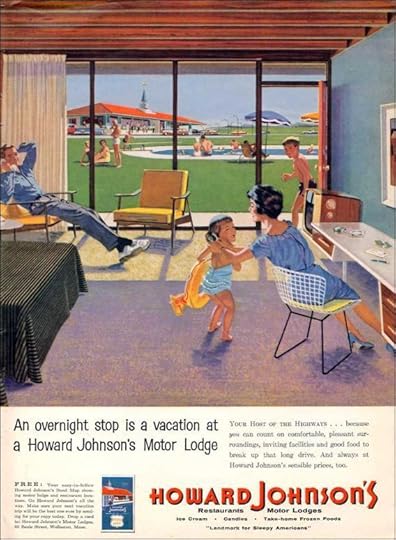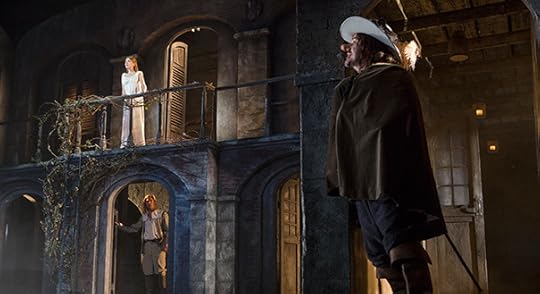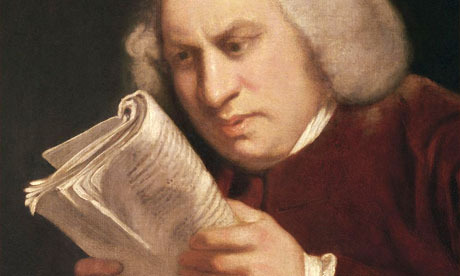Terry Teachout's Blog, page 127
October 14, 2012
TT: Just because
SX-70, a promotional film made for Polaroid in 1972 by Charles and Ray Eames. The score is by Elmer Bernstein:
(This is the latest in a series of arts-related videos that appear in this space each Monday and Wednesday.)
(This is the latest in a series of arts-related videos that appear in this space each Monday and Wednesday.)
Published on October 14, 2012 17:10
TT: Gone in sixty seconds
 My father owned three Polaroid cameras and bought a fourth one for me when I was a boy. I thought of them--and of him--when I read Christopher Bonanos'
Instant: The Story of Polaroid
, a newly published book about
Edwin H. Land
, the inventor of the first "instant camera," and the once-powerful, now-forgotten corporation that he created.
My father owned three Polaroid cameras and bought a fourth one for me when I was a boy. I thought of them--and of him--when I read Christopher Bonanos'
Instant: The Story of Polaroid
, a newly published book about
Edwin H. Land
, the inventor of the first "instant camera," and the once-powerful, now-forgotten corporation that he created.Today's smartphone-addicted youngsters can't begin to fathom the cultural impact of the Polaroid Model 95 camera, which took sepia-toned photographs that developed themselves in sixty seconds. When Land gave the first public demonstration of his invention in 1947, taking a picture of himself and displaying it to the audience a minute later, the audience gasped. What happened next, says Bonanos, was very nearly as astonishing:

The next morning, the shot of Land revealing his own mug got big play in the New York Times, along with an appreciative editorial. Newspapers all over the county ran the story. The following Monday, it was the "Picture of the Week" in Life magazine, then the alpha and omega of American photojournalism....
Remember that amateur photography, in 1947, had come along only a modest amount since [George] Eastman's first film in 1888. Yes, the cameras were better and more versatile, and color was becoming widely available. When it came time to process your pictures, however, you had two choices: build yourself a darkroom, or get your film to a lab. If you didn't live in a big city, you were probably mailing your film back to Kodak, same as in 1888. The leap to Polaroid was like replacing a messenger on horseback with your first telephone. "There is nothing like this in the history of photograph" was how the unsigned Times editorial put it.
It stands to reason that a natural-born geek like me would have been fascinated by the technological magic of Polaroid's self-developing process, and so I was. Alas, I had no visual sense--it wasn't until adulthood that I learned how to use my eyes in anything more than a superficial way--and I've never felt much inclined to preserve corporeal souvenirs of my past life, not even the carefully posed vacation snapshots that my father took by the truckload. The Polaroid Swinger , a low-priced model that came out in 1965, was the only camera that I've ever owned, or wanted to own.
No doubt part of its irresistible appeal to me lay in the youth-oriented TV commercials that introduced the Swinger (as well as a very young Ali MacGraw ) to the American public:
That said, I also suspect that when I put the Swinger at the top of my Christmas list for 1966, what I really had in mind was to emulate my father, a deep-voiced, gadget-loving man's man whom I admired without reserve but to whom I never succeeded in becoming close. The problem was that we had little in common save for a deep-seated belief in the virtue of professionalism. "A thing worth doing, son, is worth doing right," he told me over and over again, not realizing that the two of us had radically different notions of what was worth doing. When I was ten, though, I still believed that my father knew everything and could do anything, and it must have occurred to me, consciously or not, that it would please him if I tried to do something that he himself enjoyed. So I asked for and received a Swinger, and spent the next couple of years earnestly taking my own carefully posed vacation snapshots, none of which, so far as I know, have survived.
 My father's Polaroid cameras now gather dust in a dark closet. Like the orange-roofed
Howard Johnson's
restaurants and "motor lodges" to which my family repaired each time we went on vacation, they are relics of the happy childhood for which I will forever be grateful. But just as Howard Johnson's shuttered its remaining restaurants years ago, so did Polaroid stop making film in 2008, in the process turning my father's once-treasured cameras into handsome pieces of junk, relegated to irrelevance, like the Polaroid Corporation itself, by the coming of digital photography.
My father's Polaroid cameras now gather dust in a dark closet. Like the orange-roofed
Howard Johnson's
restaurants and "motor lodges" to which my family repaired each time we went on vacation, they are relics of the happy childhood for which I will forever be grateful. But just as Howard Johnson's shuttered its remaining restaurants years ago, so did Polaroid stop making film in 2008, in the process turning my father's once-treasured cameras into handsome pieces of junk, relegated to irrelevance, like the Polaroid Corporation itself, by the coming of digital photography.As for my Swinger, I've no idea what happened to it, but I still remember the jingle that Polaroid used to sell it back in 1965: It's more than a camera/It's almost alive/It's only nineteen dollars and ninety-five. That's $140.34 in today's dollars, pretty serious money for a Christmas present in Smalltown, U.S.A. It's sad to think that such a costly gift should have gone the way of all insufficiently loved toys. I wish my father were still around for me to tell him how much it meant to me once upon a time.
Published on October 14, 2012 17:10
TT: Escape
Mrs. T and I have made our post-show getaway. We'll be somewhere else all this week, but the blog--as always--will continue. See you when we see you.
Published on October 14, 2012 17:10
October 12, 2012
TT: Sometimes Macy's does tell Gimbels!
 The New York Times recently interviewed me about
Satchmo at the Waldorf
. Here's part of the story, which will appear in print on Sunday:
The New York Times recently interviewed me about
Satchmo at the Waldorf
. Here's part of the story, which will appear in print on Sunday:Who knew Louis Armstrong had such a mouth on him? And we don't mean embouchure.
With "Satchmo at the Waldorf," which opened Oct. 3 at the Long Wharf Theater in New Haven (after an earlier run in Lenox, Mass.), the critic Terry Teachout becomes a playwright. And as such, he seems to have a lot in common with David Mamet. That is, his dialogue flows with four-letter words like Beaujolais at a French cafe. The primary offender and main character is Armstrong himself, jazz trumpeter, singer and postwar America's first nonwhite sweetheart....
Armstrong's duality fascinates Mr. Teachout, a jazz aficionado who was born in Missouri and lived in Kansas City in his 20s. "The public Armstrong and the private Armstrong are very different," he said. But, he emphasized, "they're both true."
"When he went out onstage and smiled that big smile and sang 'Dolly,' he wasn't lying," he continued. "He was a fundamentally largehearted man. But he was also a genius and also a complicated man...."
Read the whole thing here .
Published on October 12, 2012 21:09
October 11, 2012
TT: The first reviews of Satchmo at the Waldorfplus a video
• In the New Haven Register:
'Satchmo' at Long Wharf Theatre does Louis Armstrong proud
• In the Hartford Courant: 'Satchmo at the Waldorf' A Solid, Engaging Portrait
• In CT Theater News and Reviews: "Satchmo" Beguiles and Engages
* * *
Excerpts from a live performance of Satchmo at the Waldorf, starring John Douglas Thompson:
• In the Hartford Courant: 'Satchmo at the Waldorf' A Solid, Engaging Portrait
• In CT Theater News and Reviews: "Satchmo" Beguiles and Engages
* * *
Excerpts from a live performance of Satchmo at the Waldorf, starring John Douglas Thompson:
Published on October 11, 2012 22:00
TT: Don't talk about the nose
In today's Wall Street Journal drama column I review the Roundabout Theatre Company's new production of
Cyrano de Bergerac
and the New York revival of
Charlie Victor Romeo
. Here's an excerpt.
* * *
Whenever a verse play opens on Broadway, and it's not by Shakespeare, chances are that it's "Cyrano de Bergerac." Indeed, Edmond Rostand's 1897 swashbuckler about the jumbo-snouted soldier who longs in vain for the love of a fair young maiden was produced there as recently as 2007. So why is the Roundabout Theatre Company putting on "Cyrano" five years later--especially since Kevin Kline played the title role last time around? Because Douglas Hodge, who won a Tony for his outrageous drag turn in the 2010 revival of "La Cage aux Folles," wanted to do it, and the Roundabout, not surprisingly, was glad to oblige him.
 Can "Cyrano" stand to be revived so soon after Mr. Kline did it so well? Probably. Though it's not a masterpiece in the normal sense of the word, M. Rostand brought off the rarest of theatrical feats: He invented an icon. Even if you've never seen or read the play, you probably know who Cyrano was and what he looked like. What's more, "Cyrano de Bergerac" is a deluxe piece of stage hokum, one whose sincere romanticism--you feel for Cyrano from start to finish--is all but impossible to resist when delivered with the playful panache exemplified by its flamboyant hero. John Simon famously said of "Cyrano" that it is "not a great play, merely a perfect one." That's exactly right. It is to verse drama what "Stagecoach" is to Westerns or "Love Affair" is to 10-hankie weepers.
Can "Cyrano" stand to be revived so soon after Mr. Kline did it so well? Probably. Though it's not a masterpiece in the normal sense of the word, M. Rostand brought off the rarest of theatrical feats: He invented an icon. Even if you've never seen or read the play, you probably know who Cyrano was and what he looked like. What's more, "Cyrano de Bergerac" is a deluxe piece of stage hokum, one whose sincere romanticism--you feel for Cyrano from start to finish--is all but impossible to resist when delivered with the playful panache exemplified by its flamboyant hero. John Simon famously said of "Cyrano" that it is "not a great play, merely a perfect one." That's exactly right. It is to verse drama what "Stagecoach" is to Westerns or "Love Affair" is to 10-hankie weepers.
Mr. Hodge gets what "Cyrano" is all about, and in its quiet moments his performance is deeply moving--but there aren't enough of them. Not only is Jamie Lloyd's staging as noisy as a concert by a band of jackhammers, but the Roundabout's production makes use of a boisterous new rhyming translation by Ranjit Bolt that updates the play's language to inconsistent effect....
"Charlie Victor Romeo," in which Collective: Unconscious, a Manhattan-based experimental theater group, takes the transcripts of black-box recordings of six mid-air crises and turns them into an evening of you-are-there playlets, is back in New York after eight years on the road. It remains the scariest show in town, a shockingly compelling portrait of what happens in the cockpit of an airplane when everything starts to go wrong. Documentary plays tend to be both over-earnest and painfully ponderous, but "Charlie Victor Romeo" (the title of which is military alphabetic code for "cockpit voice recorder") moves so fast that you'll feel as though you'd looked the wrong way and stepped into a mile-deep pothole....
* * *
Read the whole thing here .
An excerpt from Charlie Victor Romeo:
* * *
Whenever a verse play opens on Broadway, and it's not by Shakespeare, chances are that it's "Cyrano de Bergerac." Indeed, Edmond Rostand's 1897 swashbuckler about the jumbo-snouted soldier who longs in vain for the love of a fair young maiden was produced there as recently as 2007. So why is the Roundabout Theatre Company putting on "Cyrano" five years later--especially since Kevin Kline played the title role last time around? Because Douglas Hodge, who won a Tony for his outrageous drag turn in the 2010 revival of "La Cage aux Folles," wanted to do it, and the Roundabout, not surprisingly, was glad to oblige him.
 Can "Cyrano" stand to be revived so soon after Mr. Kline did it so well? Probably. Though it's not a masterpiece in the normal sense of the word, M. Rostand brought off the rarest of theatrical feats: He invented an icon. Even if you've never seen or read the play, you probably know who Cyrano was and what he looked like. What's more, "Cyrano de Bergerac" is a deluxe piece of stage hokum, one whose sincere romanticism--you feel for Cyrano from start to finish--is all but impossible to resist when delivered with the playful panache exemplified by its flamboyant hero. John Simon famously said of "Cyrano" that it is "not a great play, merely a perfect one." That's exactly right. It is to verse drama what "Stagecoach" is to Westerns or "Love Affair" is to 10-hankie weepers.
Can "Cyrano" stand to be revived so soon after Mr. Kline did it so well? Probably. Though it's not a masterpiece in the normal sense of the word, M. Rostand brought off the rarest of theatrical feats: He invented an icon. Even if you've never seen or read the play, you probably know who Cyrano was and what he looked like. What's more, "Cyrano de Bergerac" is a deluxe piece of stage hokum, one whose sincere romanticism--you feel for Cyrano from start to finish--is all but impossible to resist when delivered with the playful panache exemplified by its flamboyant hero. John Simon famously said of "Cyrano" that it is "not a great play, merely a perfect one." That's exactly right. It is to verse drama what "Stagecoach" is to Westerns or "Love Affair" is to 10-hankie weepers.Mr. Hodge gets what "Cyrano" is all about, and in its quiet moments his performance is deeply moving--but there aren't enough of them. Not only is Jamie Lloyd's staging as noisy as a concert by a band of jackhammers, but the Roundabout's production makes use of a boisterous new rhyming translation by Ranjit Bolt that updates the play's language to inconsistent effect....
"Charlie Victor Romeo," in which Collective: Unconscious, a Manhattan-based experimental theater group, takes the transcripts of black-box recordings of six mid-air crises and turns them into an evening of you-are-there playlets, is back in New York after eight years on the road. It remains the scariest show in town, a shockingly compelling portrait of what happens in the cockpit of an airplane when everything starts to go wrong. Documentary plays tend to be both over-earnest and painfully ponderous, but "Charlie Victor Romeo" (the title of which is military alphabetic code for "cockpit voice recorder") moves so fast that you'll feel as though you'd looked the wrong way and stepped into a mile-deep pothole....
* * *
Read the whole thing here .
An excerpt from Charlie Victor Romeo:
Published on October 11, 2012 22:00
MP3
The Story-Teller...A Session With Charles Laughton
. Long unavailable in any format, this double album of one of Charles Laughton's celebrated public readings, originally recorded by Capitol in 1961 and released after his death, can now be downloaded as a set of mp3 files. The thirteen tracks range from Psalm 104 to Plato's Phaedrus to Jack Kerouac's "The Dharma Bums," all read with profound comprehension and immense panache by one of the great stage artists of the twentieth century (TT).
Published on October 11, 2012 20:43
TT: Almanac
"Always be glad you're not at the dentist."
Groucho Marx (quoted in Robert Dwan, As Long as They're Laughing!: Groucho Marx and You Bet Your Life)
Groucho Marx (quoted in Robert Dwan, As Long as They're Laughing!: Groucho Marx and You Bet Your Life)
Published on October 11, 2012 18:23
TT: Due to circumstances beyond our control
This week's Wall Street Journal "Sightings" column, which would normally have run today, will instead appear in next Tuesday's paper in order to coincide with an important anniversary. Come back then!
Published on October 11, 2012 18:23
TT: There will our hearts be
From New York to Smalltown, U.S.A., to Chicago to San Francisco to San Diego to Ontario to the MacDowell Colony to Minneapolis to Lenox to Spring Green to New Haven...and now, at long last, I'm back where I started.
 Mrs. T and I have never had a summer quite like this one.
Some
of
it
was glorious, some
heartbreaking
, and rarely did I know when I got up in the morning which of the two would prevail come day's end. A couple of times the verdict was
so mixed
that I didn't know whether to laugh or cry--so I did both.
Mrs. T and I have never had a summer quite like this one.
Some
of
it
was glorious, some
heartbreaking
, and rarely did I know when I got up in the morning which of the two would prevail come day's end. A couple of times the verdict was
so mixed
that I didn't know whether to laugh or cry--so I did both.
What did I bring back with me? I received a Guggenheim Fellowship. I wrote a good-sized chunk of Mood Indigo and revised The Letter and Satchmo at the Waldorf at MacDowell. I made two treasured new friends. And the revised version of Satchmo was produced twice, in Lenox and New Haven, with a third staging, at Philadelphia's Wilma Theater , coming in November.
So yes, it was a productive and exciting summer, but enough is enough. I have a book to finish, mail to answer, prints to hang, old friends whom I miss, and plenty of shows to see. It's time to unpack the bags and put my feet up--and to try to digest the near-overwhelming events of the past few months.
I suspect that in every person's life there comes a point beyond which all joy is tinged with sorrow. I know I've reached it. As Mrs. T and I waited for the opening-night performance of Satchmo at the Waldorf to get started, I whispered to her, "You know who I wish were here?" Before I could answer my own question, my head was full of names. My mother and father, my beloved Nancy LaMott, Dick Sudhalter, Bob Brookmeyer, Howard Kissel...the list goes on and on. All would have loved to be there, and all are gone.
 On the other hand, this melancholy, understandable though it is, can be carried too far. Dr. Johnson, for all his firm good sense, did just that in the oft-quoted last sentence of the preface to his Dictionary of the English Language:
On the other hand, this melancholy, understandable though it is, can be carried too far. Dr. Johnson, for all his firm good sense, did just that in the oft-quoted last sentence of the preface to his Dictionary of the English Language:
Dr. Johnson was, of course, talking about his wife, who died while he was struggling to complete the Dictionary. He believed that his own chronic laziness (which to us looks more like chronic depression) kept him from getting the job done sooner, in the process contributing to her death. Very likely it did.
I think I know something of how he felt. But I also know that there are countless people in my life, Mrs. T foremost among them, whose love and support have helped to make the best parts of the summer just past even better. One of them, a fellow playwright, sent this message to me back in April: "When good news comes in tsunamis, you have to be wildly awake and aware! Enjoy it! This is the way life should be."
Should be and--needless to say--too often is not. I'm sure I haven't always been careful enough to be grateful for all my good fortune, much less to be fully aware of it while it was happening. Perhaps I've just been too busy to take it all in. That's why I need to spend some quiet time at home and reflect on recent events, good and bad alike.
 It won't be long, of course, before I have to hit the road again. On Sunday Mrs. T and I are taking a few days off and heading for two of our
favorite
haunts
for a fifth-anniversary mini-holiday, and come November I'll go to Philadelphia to help get Satchmo up and running at the Wilma.
It won't be long, of course, before I have to hit the road again. On Sunday Mrs. T and I are taking a few days off and heading for two of our
favorite
haunts
for a fifth-anniversary mini-holiday, and come November I'll go to Philadelphia to help get Satchmo up and running at the Wilma.
Right now, though, I haven't got a single flight booked, whether to Chicago or Orlando or Smalltown or anywhere else. I need to sleep in my own bed again. The world can wait.
* * *
Pat Metheny plays "Last Train Home":
 Mrs. T and I have never had a summer quite like this one.
Some
of
it
was glorious, some
heartbreaking
, and rarely did I know when I got up in the morning which of the two would prevail come day's end. A couple of times the verdict was
so mixed
that I didn't know whether to laugh or cry--so I did both.
Mrs. T and I have never had a summer quite like this one.
Some
of
it
was glorious, some
heartbreaking
, and rarely did I know when I got up in the morning which of the two would prevail come day's end. A couple of times the verdict was
so mixed
that I didn't know whether to laugh or cry--so I did both.What did I bring back with me? I received a Guggenheim Fellowship. I wrote a good-sized chunk of Mood Indigo and revised The Letter and Satchmo at the Waldorf at MacDowell. I made two treasured new friends. And the revised version of Satchmo was produced twice, in Lenox and New Haven, with a third staging, at Philadelphia's Wilma Theater , coming in November.
So yes, it was a productive and exciting summer, but enough is enough. I have a book to finish, mail to answer, prints to hang, old friends whom I miss, and plenty of shows to see. It's time to unpack the bags and put my feet up--and to try to digest the near-overwhelming events of the past few months.
I suspect that in every person's life there comes a point beyond which all joy is tinged with sorrow. I know I've reached it. As Mrs. T and I waited for the opening-night performance of Satchmo at the Waldorf to get started, I whispered to her, "You know who I wish were here?" Before I could answer my own question, my head was full of names. My mother and father, my beloved Nancy LaMott, Dick Sudhalter, Bob Brookmeyer, Howard Kissel...the list goes on and on. All would have loved to be there, and all are gone.
 On the other hand, this melancholy, understandable though it is, can be carried too far. Dr. Johnson, for all his firm good sense, did just that in the oft-quoted last sentence of the preface to his Dictionary of the English Language:
On the other hand, this melancholy, understandable though it is, can be carried too far. Dr. Johnson, for all his firm good sense, did just that in the oft-quoted last sentence of the preface to his Dictionary of the English Language:I have protracted my work till most of those whom I wished to please, have sunk into the grave, and success and miscarriage are empty sounds: I therefore dismiss it with frigid tranquillity, having little to fear or hope from censure or from praise.
Dr. Johnson was, of course, talking about his wife, who died while he was struggling to complete the Dictionary. He believed that his own chronic laziness (which to us looks more like chronic depression) kept him from getting the job done sooner, in the process contributing to her death. Very likely it did.
I think I know something of how he felt. But I also know that there are countless people in my life, Mrs. T foremost among them, whose love and support have helped to make the best parts of the summer just past even better. One of them, a fellow playwright, sent this message to me back in April: "When good news comes in tsunamis, you have to be wildly awake and aware! Enjoy it! This is the way life should be."
Should be and--needless to say--too often is not. I'm sure I haven't always been careful enough to be grateful for all my good fortune, much less to be fully aware of it while it was happening. Perhaps I've just been too busy to take it all in. That's why I need to spend some quiet time at home and reflect on recent events, good and bad alike.
 It won't be long, of course, before I have to hit the road again. On Sunday Mrs. T and I are taking a few days off and heading for two of our
favorite
haunts
for a fifth-anniversary mini-holiday, and come November I'll go to Philadelphia to help get Satchmo up and running at the Wilma.
It won't be long, of course, before I have to hit the road again. On Sunday Mrs. T and I are taking a few days off and heading for two of our
favorite
haunts
for a fifth-anniversary mini-holiday, and come November I'll go to Philadelphia to help get Satchmo up and running at the Wilma.Right now, though, I haven't got a single flight booked, whether to Chicago or Orlando or Smalltown or anywhere else. I need to sleep in my own bed again. The world can wait.
* * *
Pat Metheny plays "Last Train Home":
Published on October 11, 2012 16:58
Terry Teachout's Blog
- Terry Teachout's profile
- 45 followers
Terry Teachout isn't a Goodreads Author
(yet),
but they
do have a blog,
so here are some recent posts imported from
their feed.



